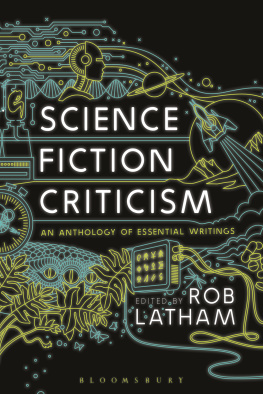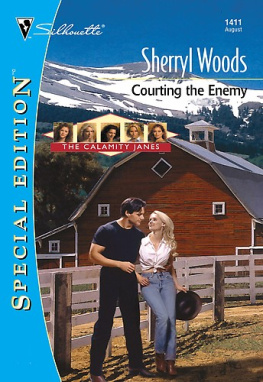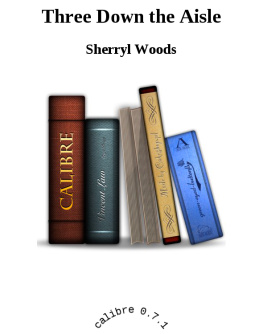Sherryl Vint - Science Fiction
Here you can read online Sherryl Vint - Science Fiction full text of the book (entire story) in english for free. Download pdf and epub, get meaning, cover and reviews about this ebook. year: 2021, publisher: MIT Press, genre: Romance novel. Description of the work, (preface) as well as reviews are available. Best literature library LitArk.com created for fans of good reading and offers a wide selection of genres:
Romance novel
Science fiction
Adventure
Detective
Science
History
Home and family
Prose
Art
Politics
Computer
Non-fiction
Religion
Business
Children
Humor
Choose a favorite category and find really read worthwhile books. Enjoy immersion in the world of imagination, feel the emotions of the characters or learn something new for yourself, make an fascinating discovery.

- Book:Science Fiction
- Author:
- Publisher:MIT Press
- Genre:
- Year:2021
- Rating:4 / 5
- Favourites:Add to favourites
- Your mark:
- 80
- 1
- 2
- 3
- 4
- 5
Science Fiction: summary, description and annotation
We offer to read an annotation, description, summary or preface (depends on what the author of the book "Science Fiction" wrote himself). If you haven't found the necessary information about the book — write in the comments, we will try to find it.
Science Fiction — read online for free the complete book (whole text) full work
Below is the text of the book, divided by pages. System saving the place of the last page read, allows you to conveniently read the book "Science Fiction" online for free, without having to search again every time where you left off. Put a bookmark, and you can go to the page where you finished reading at any time.
Font size:
Interval:
Bookmark:

The MIT Press Essential Knowledge Series
A complete list of the titles in this series appears at the back of this book.
Sherryl Vint
The MIT Press | Cambridge, Massachusetts | London, England
2021 Massachusetts Institute of Technology
All rights reserved. No part of this book may be reproduced in any form by any electronic or mechanical means (including photocopying, recording, or information storage and retrieval) without permission in writing from the publisher.
This book was set in Chaparral Pro by New Best-set Typesetters Ltd.
Library of Congress Cataloging-in-Publication Data
Names: Vint, Sherryl, 1969- author.
Title: Science fiction / Sherryl Vint.
Description: Cambridge, Massachusetts : The MIT Press, [2021] | Series: The MIT Press essential knowledge series | Includes bibliographical references and index. | Summary: An overview of how science fiction has grappled with the ways that science and technology shape and change human lives, emphasizing the challenges of the 21st centuryProvided by publisher.
Identifiers: LCCN 2020008515 | ISBN 9780262539999 (paperback)
Subjects: LCSH: Science fictionHistory and criticism. | Science fictionSocial aspects.
Classification: LCC PN3433.5 .V55 2021 | DDC 809.3/8762dc23
LC record available at https://lccn.loc.gov/2020008515
10 9 8 7 6 5 4 3 2 1
d_r0
The MIT Press Essential Knowledge series offers accessible, concise, beautifully produced pocket-size books on topics of current interest. Written by leading thinkers, the books in this series deliver expert overviews of subjects that range from the cultural and the historical to the scientific and the technical.
In todays era of instant information gratification, we have ready access to opinions, rationalizations, and superficial descriptions. Much harder to come by is the foundational knowledge that informs a principled understanding of the world. Essential Knowledge books fill that need. Synthesizing specialized subject matter for nonspecialists and engaging critical topics through fundamentals, each of these compact volumes offers readers a point of access to complex ideas.
It has become axiomatic to say that the world is becoming like science fiction (sf). From mobile phones that speak to us (reminding Star Trek fans of tricorders), to genetically modified foods, to the Internet of Things and the promise of self-driving cars, people in industrialized nations live immersed in technology. Daily life can thus at times seem like visions from the pulp sf of the 1920s and 1930seither a world perfected by technology, manifested in events such as the 1939 Worlds Fair, with its theme The World of Tomorrow; or a dystopian nightmare, such as Aldous Huxleys Brave New World (1932). How might sf help us conceptualize and respond to a world that has begun to resemble sf, in ways both marvelous and malign? This book provides an overview of how sf grapples with the ways that science and technology shape and change human lives. As introduced here, the genre is a tool for thinking about and intervening in the world. This book is about what science fiction can do, not a catalogue of important authors and titles.
The genre is a tool for thinking about and intervening in the world. This book is about what science fiction can do.
There are many competing claims regarding precisely how to define sf and how to determine when the genre began. Some argue for a long tradition of all speculative writing about science, dating back to Johannes Keplers Somnium (1608) or even earlier. Others link it to utopian writing, beginning with Thomas Mores Utopia (1516); later utopias offered visions of future societies in examples such as Edward Bellamys Looking Backward, 20001887 (1888) and William Morriss News from Nowhere (1890). Still others see H. G. Wellss scientific romances and Jules Vernes Voyages extraordinaires as the fathers of a genre whose origins are inextricably linked to science becoming culturally dominant in Western cultures during the late nineteenth and early twentieth centuries. In his insider history of the genre, Billion Year Spree (1973), Brian Aldiss influentially dubs Mary Shelleys Frankenstein (1818) the first sf novel, a work that fuses the latest innovations in science with a humanist tradition of thinking about society and ethics. A popular trend dates sfs origin to the American pulps of the 1920s, chiefly Hugo Gernsbacks Amazing Stories, which tapped into an emergent, enthusiastic community of experimenters and technicians. Gernsback is responsible for popularizing the term science fiction, a less complicated version of his original scientification. In the first issue of Amazing Stories (1926), he announced this was to be a new sort of fiction for a century that would chart a new path in literature and in progress as well. For original fan communities, the Gernsback era was foundational, and his technophilic pronouncements are the core of the genre, but his view represents only one facet of a complex tradition.
Rather than elaborate this history or take a position on the origins of science fiction, this book focuses on what they share at their core: a vision of the world made otherwise and the possibilities that might flow from such change. My goal is to provide neither a detailed history of the genre nor a comprehensive listing of its most important works. Rather, following John Rieder, I am interested in focusing on what science fiction can do, how it has been described by a variety of constituencies in distinct ways for multiple ends. I plan to chart how sf is evoked and used by a range of authors and audiences and sketch an overview of how the genre has beenand continues to beuseful for grasping daily life in industrialized, technologized societies.
Although there may be no precise demarcation of what the term science fiction denotes, certain images or narratives immediately come to mind: enhanced mobility via rocket ships or flying cars; immersion in digitized environments, from virtual entertainments to perhaps digitally transferring ones consciousness to a new body; and the idea of the future, which may include radically different citizens such as self-conscious robots or genetically modified people, perhaps even aliens. A set of images thus conveys the core of science fiction, even if the boundaries at its edges are indistinct, a situation further complicated by the fact that different communities have diverse ideas in mind when they claim the label and try to define the genre it describes. Many fans and scholars of sf, for example, argue that its print form is inevitably more nuanced than media versions, a claim confusing to twenty-first-century audiences for whom science fiction is often synonymous with widely known media texts such as Star Trek, which has been on television or film screens in myriad iterations since 1966.
Margaret Atwoods widely circulated claim that she writes speculative rather than science fiction, because she extrapolates from known science rather than inventing futuristic versions of it, embodies the confusion: not only would most readers recognize her most widely known worksThe Handmaids Tale (1985) and the MaddAddam trilogy (20032013)as science fiction, but most practitioners and fans of science fiction would also agree that much (not all!) sf similarly extrapolates from known science.
Next pageFont size:
Interval:
Bookmark:
Similar books «Science Fiction»
Look at similar books to Science Fiction. We have selected literature similar in name and meaning in the hope of providing readers with more options to find new, interesting, not yet read works.
Discussion, reviews of the book Science Fiction and just readers' own opinions. Leave your comments, write what you think about the work, its meaning or the main characters. Specify what exactly you liked and what you didn't like, and why you think so.











